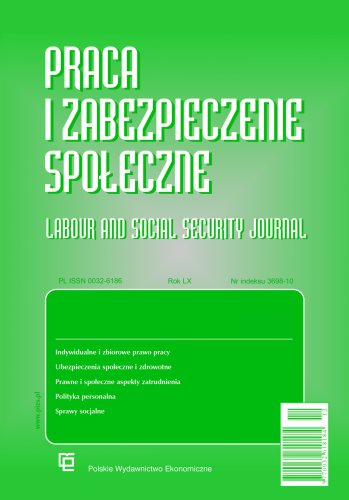Definicja sztucznej inteligencji w nauce prawa pracy
Artykuł dotyczy problemu definicji systemów sztucznej inteligencji (SI) w kontekście prawa pracy. Propozycje definicji SI przedstawione przez Komisję Europejską i Parlament Europejski w projekcie AI ACT są zbyt niejasne z perspektywy prawa pracy. Autor stawia hipotezę, że zamiast ogólnikowego pojęcia SI, badania powinny skupić się na konkretnych cechach systemu SI, takich jak zautomatyzowane systemy podejmowania decyzji i ich wpływ na prawa i obowiązki pracowników. Przeprowadzając analizę SI na gruncie nauki prawa pracy celowe jest zastosowanie odpowiednich metod badawczych, w szczególności metod hermeneutycznych i aksjologicznego badania prawa.
Bibliografia
Ebert, I., Wildhaber, I. & Adams-Prassl, J. (2012, maj 5). Big Data in the workplace: Privacy Due Diligence as a human rights-based approach to employee privacy protection. Big Data & Society, 8(1). DOI 10.1177/20539517211013051
AlgorithmWatch. (n.d.). Submission to the Report of the United Nations Special Rapporteur on extreme poverty and human rights. Retrieved from https://www.ohchr.org/sites/default/files/Documents/Issues/Poverty/DigitalTechnology/AlgorithmWatch.pdf
Aloisi, A. & De Stefano, V. (2022). Your Boss Is an Algorithm. Artificial Intelligence, Platform Work and Labour. Bloomsbury Publishing.
Aloisi, A. & Potocka-Sionek, N. (2022). De-gigging the labour market? An analysis of the 'algorithmic management' provisions in the proposed Platform Work Directive. Italian Labour Law E-Journal, 15(1). DOI 10.6092/issn.1561-8048/15027
Barankiewicz, T. (2022). Metody myślenia, badania prawa i systematyzacji wiedzy w naukach prawnych. In: H. Izdebski, & A. Łazarska, Metodologia dysertacji doktorskiej dla prawników (pp. 101–133). Wolters Kluwer.
Barański, M. (2022, 2). Initial Remarks on Artificial Intelligence and Axiological Foundations of Labour Law. Studia z Zakresu Prawa Pracy i Polityki Społecznej, 29(2), 85–93. DOI 10.4467/25444654SPP.22.008.15682
Bartoszewicz, M. (2018). Definicje legalne w świetle zasady określoności prawa. Prace Naukowe Wydziału Prawa, Administracji i Ekonomii Uniwersytetu Wrocławskiego. E-Monografie, nr 114.
Biswas, S. (2021). The Beginner's Guide to AI in HR. Retrieved from spiceworks: https://www.spiceworks.com/tech/innovation/articles/thebeginners-guide-to-ai-in-hr/
Council of Europe study. (2018). ALGORITHMS AND HUMAN RIGHTS. Study on the human rights dimensions of automated data processing techniques and possible regulatory implications. Council of Europe.
Davidov, G. (2011). Re-Matching Labour Law With Their Purpose. In G. D. Langille, The Idea of Labour Law.
Davidov, G. (n.d.). How, Articulating Labour Law's Goals: Why and. SSRN. doi:Davidov, Guy, Articulating Labour Law's Goals: Why and How (January 20, 2012). Available at SSRN: https://ssrn.com/abstract=1989136 or http://dx.doi.org/10.2139/ssrn.1989136
Edwards, L. (2022). Regulating AI in Europe: four problems and four solutions. ADA Lovelace Institute.
EU. (2023, Marzec 15). Retrieved from joinup.ec.europa.eu: https://joinup.ec.europa.eu/collection/rolling-plan-ict-standardisation/artificialintelligence-rp2023
European Parliament. (2023). Proposal for a regulation of the European Parliament and of the Council on harmonised rules on Artificial Intelligence (Artificial Intelligence Act) and amending certain Union Legislative Acts.
Flasiński, M. (2011). Wstęp do sztucznej inteligencji. Wydawnictwo Naukowe PWN.
Ge, W. (2019). Humans in the Loop: The Design of Interactive AI Systems. Retrieved from Stanford University (link is external).
Johnson-Laird, P. (1999). Umysł i komputer. Wydawnictwo PROTEXT.
Kubiak-Cyrul, A. (2020). Rekomendacje OECD jako ramy etyczne i prawne. Studia Prawnicze. Rozprawy i Materiały, 26(1).
Leslie, D., Burr, C., Aitken, M., Cowls, J., Katell, M., & Briggs, M. (2021). Artificial intelligence, human rights, democracy and the rule of law. Council of Europe and The Alan.
Mateescu, A. & Nguyen, A. (2019). Algorithmic Management in the Workplace. Data & Society.
Mazur, J. (2021). Algorytm jako informacja publiczna w prawie europejskim. Wydawnictwa Uniwersytetu Warszawskiego. DOI 10.31338/ uw.9788323551355
McKinsey & Company. (2023, styczeń). mckinsey.com. Retrieved from What is generative AI?: https://www.mckinsey.com/featuredinsights/mckinsey-explainers/what-is-generative-ai
Mosqueira-Rey, E., Hernández-Pereira, E., Alonso-Ríos, D., Bobes-Bascarán, J. & Fernández-Leal, Á. (2022). Human-in-the-loop machine learning: a state of the art. Artificial Intelligence Review. DOI 10.1007/s10462-022-10246-w
Nowik, P. (2021). Electronic personhood for artificial intelligence in the workplace. Computer Law & Security Review, 42. DOI 10.1016/ j.clsr.2021.105584
OECD. (2019). Artificial Intelligence in Society. https://www.oecd.org/publications/artificial-intelligence-in-society-eedfee77-en.htm
OECD. (2022). Using Artificial Intelligence in the workplace. OECD Social, Employment and Migration Working Papers.
OECD. (n.d.). Recommendation of the Council on Artificial Intelligence, OECD/LEGAL/0449.
Patryas, W. (1997). Definiowanie pojęć prawnych. Wydawnictwo Naukowe Uniwersytetu im. Adama Mickiewicza.
Rainone, S. (2023). The changing meaning of 'asset', 'undertaking' and 'establishment' in the digital workplace. Retrieved from Global Workplace Law & Policy: https://global-workplace-law-and-policy.kluwerlawonline.com/2023/06/14/the-changing-meaning-of-asset-undertaking-andestablishment-in-the-digital-workplace/
Rejmaniak, R. (2021). Autonomiczność systemów sztucznej inteligencji. Roczniki Nauk Prawnych, XXXI(3). DOI 10.18290/rnp21313.6
Richardson, R. (2012). Defining and Demystifying Automated Decision Systems. Maryland Law Review, Forthcoming. Retrieved from https://papers.ssrn.com/sol3/papers.cfm?abstract_id=3811708
Stiller, S., Jäger, J., & Gießler, S. (2021). Automated decisions and Artificial Intelligence in human resource management Guideline for reviewing essential features of AI-based systems for works councils and other staff representatives. Berlin: AW AlgorithmWatch.
Waas, B. (2022). Artificial Intelligence and labour law. The Hugo Sinzheimer Institute for Labour and Social Security Law.
Washington State Legislature. (n.d.). Senate Bill 5116 – Washington State Legislature. Retrieved from https://app.leg.wa.gov/ billsummary?Year=2021&BillNumber=5116

